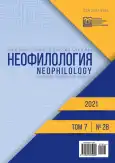Influence of Cultural and Educational Traditions on Critical Thinking Formation Practices
- Authors: Sertakova I.N.1
-
Affiliations:
- Derzhavin Tambov State University
- Issue: Vol 7, No 28 (2021)
- Pages: 735-742
- Section: КУЛЬТУРОЛОГИЯ
- URL: https://journal-vniispk.ru/2587-6953/article/view/302415
- DOI: https://doi.org/10.20310/2587-6953-2021-7-28-735-742
- ID: 302415
Cite item
Full Text
Abstract
We consider the cultural and philosophical aspects of critical thinking and scientific approaches to them in the classical and postclassical philosophy of education. We characterize the specific features of thinking and requirements for it within the framework of the traditional and new models of educational values. We note that in the culturological value context an important place is occupied not by individual models as an intrinsic value, but by the presence of continuity, the implementation of the principles of complementarity and interdependence of “traditional” and “modern”. We analyze the concepts of “culture of thinking” and “culture of education”. We provide definitions and levels of critical thinking in their relation to universal human cultural values, taking into account the awareness of the multipolarity of world. We propose an approach to solving problematic issues related to the formation of critical thinking, in accordance not only with historically established philosophical doctrines about thinking, but also with cultural and educational traditions. As an example of the traditions influence of culture of thinking on the critical thinking formation, such educational practice as “Philosophy for Children” is given. We substantiate the choice of programs and methods of philosophizing with children based on cultural reality and spiritual problems (intellectual, political, ethical, etc.), characteristic of a particular state. We conclude that there is a close relationship between cultural and educational traditions and key aspects of the critical thinking formation.
Keywords
About the authors
I. N. Sertakova
Derzhavin Tambov State University
Author for correspondence.
Email: irinasertakova@yandex.ru
ORCID iD: 0000-0002-9812-855X
Candidate of Philosophy, Associate Professor of Philosophy and Methodology of Science Department
Russian Federation, 33 Internatsionalnaya St., Tambov 392000, Russian FederationReferences
- Vankhemping E.G., Novak M.A. Innovatsionnyye praktiki i grazhdanskiye initsiativy v obrazovanii pokoleniya Z [Generation Z Innovative Practices and Civic Initiatives in Education]. St. Petersburg, Publishing and Printing Association of Higher Educational Institutions, 2020, 246 p. (In Russian).
- Kurganskaya V.D., Shaykemelev M.S.-A. Kul’turnyye traditsii i innovatsii v reformirovanii sistemy obrazovaniya [Cultural traditions and innovations in education reforms]. Voprosy obrazovaniya – Educational Studies Moscow, 2020, no. 4, pp. 273-287. (In Russian).
- Kurennoy V.A. Filosofiya liberal’nogo obrazovaniya: konteksty [Philosophy of liberal education: the contexts]. Voprosy obrazovaniya – Educational Studies Moscow, 2020, no. 2, pp. 8-36. (In Russian).
- Kashina N.I. Osvoyeniye det’mi i molodezh’yu traditsionnykh kul’turnykh i khudozhestvennykh tsennostey [Mastering by Children and Youth of Traditional Cultural and Artistic Values]. Yekaterinburg, Ural State Pedagogical University Publ., 2014, 183 p. (In Russian).
- Varfolomeyeva S.V. Rossiyskiye pedagogicheskiye traditsii i vozmozhnosti ikh ispol’zovaniya v sovremennom obrazovanii [Russian pedagogical traditions and opportunities of its usage in modern education]. Gumanitarnyye i sotsial’nyye nauki – The Humanities and Social Sciences, 2019, no. 5, pp. 228-236. (In Russian).
- Glagolev V.S. Kul’tura obrazovaniya v usloviyakh sovremennogo rossiyskogo obshchestva [The Culture of Education in the Conditions of Modern Russian Society]. (In Russian). Available at: https://mgimo.ru/ upload/iblock/5e3/kultura-obrazovaniya-v-usloviyah-sovremennogo-rossijskogo-obshchestva.pdf (accessed 19.07.2021).
- Tonkonogov A.V. Kul’tura chelovecheskogo myshleniya kak sotsial’nyy fenomen [Culture of human thought as a social phenomenon]. Sotsial’no-gumanitarnyye znaniya [Social and Humanitarian Knowledge], 2013, no. 4, pp. 104-115. (In Russian).
- Vasilenko (Kolesova) E.P. Kriticheskoye myshleniye kak sovremennaya problema lichnosti [Critical thinking as the contemporary problem of identity]. Kontsept – Concept, 2013, no. 12 (December), pp. 91-95. (In Russian). Available at: http://e-koncept.ru/2013/13259.htm (accessed 22.07.2021).
- Bobrova A.S. Kriticheskoye myshleniye. Problema opredeleniya [Critical thinking. Definition problem]. RATsIO.ru – RACIO.ru, 2017, no. 1 (18), pp. 26-36. (In Russian).
- Lipman M. Thinking in education. Cambridge, Cambridge University Press, 2001, 316 p. (In Russian).
- Kokhan U.O. Paulo Freyre i «Filosofiya dlya detey»: kriticheskiy dialog [Paulo Freire and “Philosophy for children”: critical dialogue]. Sotsium i vlast’ – Society and Power, 2018, № 6 (74), pp. 55-67. (In Russian).
Supplementary files









